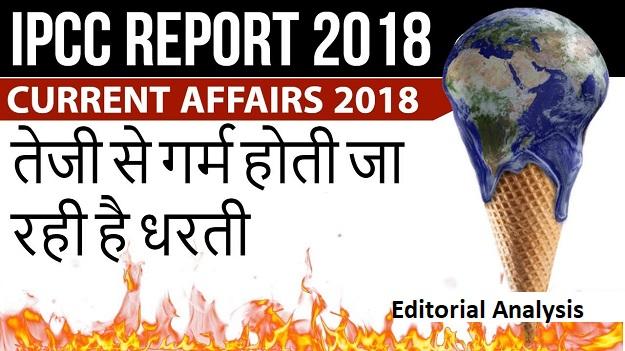Table of Contents
IPCC comes under UNITED NATIONS.
UPSC 2014 PRELIMS
Consider the following statements regarding ‘Earth Hour’
1. It is an initiative of UNEP and UNESCO.
2. It is a movement in which the participants switch off the lights for one hour on a specific day every year.
3. It is a movement to raise awareness about climate change and the need to save the planet.
Which of the statements given above is/are correct?
1. 1 and 3 only
2. 2 only
3. 2 and 3 only.
4. 1, 2 and 3
ANSWER – 3
• It’s a symbolic global initiative by World Wildlife Fund (WWF). So 1 is wrong, A and D eliminated.
• Other two are correct as per the same report.
WHAT HAPPENED RECENTLY?
The Intergovernmental Panel on Climate Change releases its ‘special report’ on limiting global temperatures recently.
WHAT IS IPCC?
• The Intergovernmental Panel on Climate Change (IPCC) is a scientific and intergovernmental body under the auspices of the United Nations
• It was first established in 1988 by two United Nations organizations, the World Meteorological Organization (WMO) and the United Nations Environment Programme (UNEP), and later endorsed by the United Nations General Assembly through Resolution 43/53.
FACT ABOUT IPCC (VERY IMPORTANT)
Won the Nobel Prize in 2007
Nobel Peace Prize was shared, in equal parts, between the IPCC and Al Gore(Have fought may fight for saving the environment)
THEIR ASSESSMENT REPORTS ARE IMPORTANT?
Assessment Reports Year of Publication
First 1990
Second 1995
Third 2001
Fourth 2007
WHAT IS THE 1.5-DEGREE QUESTION?
Previous Periodic Assessment Reports produced by the IPCC seemed to suggest that the impacts of climate change could be “irreversible” and “catastrophic” if the rise in temperature was allowed to go beyond the 2°C ceiling.
NOTES
The Paris Agreement sought to ‘hold’ the increase in global average temperature to “well below” 2°C, while it also promised to keep “pursuing efforts” to attain the 1.5°C target.
WHAT DOES THE REPORT SAY?
• The report predicts the possibility to keep the increase in global average temperatures to within 1.5 degrees Celsius of pre-industrial times.
• The world would need to bring down its greenhouse gas to about half of its 2010 levels by 2030, and to net zero by about 2050.
• As of now, the aim is to reduce greenhouse gases by only 20%, from 2010 levels, by the year 2030 and achieve a net-zero emission level by the year 2075.
DIFFICULT TIMES AHEAD
• The IPCC climate change report makes it clear that the world will witness greater sea level rise, higher frequency of droughts and floods, and heatwaves and countries like India with large populations dependent on the agricultural and fishery sectors would be profoundly impacted.
NOTES
• The US is the biggest obstacle to forming a global coalition to fight climate change. The world needs to unite against the obstructive approach of the US.
• Paris Agreement and UNFCCC cannot be the only way ahead to address climate change. The world needs a ‘Plan B’ to address climate change.
WHAT NEXT?
• The report points out that “climate-related risks to health, livelihoods, food security, water supply, human security, and economic growth” are projected to increase with global warming of 1.5 degrees Celsius and increase further with 2 degrees Celsius.
• Thus all these will serve as a key scientific input in the upcoming Katowice Climate Change Conference in Poland, where every country should keep this report as a base and revise their targets accordingly.






















 WhatsApp
WhatsApp